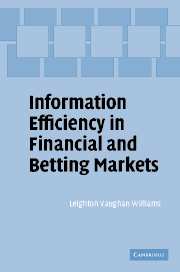Book contents
- Frontmatter
- Contents
- List of figures
- List of tables
- List of contributors
- Introduction
- Part I The concept of information efficiency
- Part II Selected readings
- 4 An assessment of quasi-arbitrage opportunities in two fixed-odds horse-race betting markets
- 5 The presence of favourites and biases in bookmakers' odds
- 6 Searching for semi-strong form inefficiency in the UK racetrack betting market
- 7 Models, markets, polls and pundits: a case study of information efficiency
- 8 Longshot bias: insights from the betting market on men's professional tennis
- 9 Biases and insider trading in exotic bets on thoroughbreds
- 10 On the improbability of information efficient parimutuel betting markets in the presence of heterogeneous beliefs
- 11 Modelling gambling demand in a laboratory casino: discovering the importance of individual-specific effects
- 12 Market efficiency of the 50–30–20–10 horse-racing spread betting market
- 13 Insider trading and bias in a market for state-contingent claims
- 14 Rationality and efficiency in lotto games
- 15 Efficiency of the odds on English professional football matches
- 16 Modelling distance preference in flat racing via average velocity
- 17 Testing for market efficiency in gambling markets: some observations and new statistical tests based on a bootstrap method
- 18 Information (in)efficiency in prediction markets
- Index
- References
10 - On the improbability of information efficient parimutuel betting markets in the presence of heterogeneous beliefs
Published online by Cambridge University Press: 09 July 2009
- Frontmatter
- Contents
- List of figures
- List of tables
- List of contributors
- Introduction
- Part I The concept of information efficiency
- Part II Selected readings
- 4 An assessment of quasi-arbitrage opportunities in two fixed-odds horse-race betting markets
- 5 The presence of favourites and biases in bookmakers' odds
- 6 Searching for semi-strong form inefficiency in the UK racetrack betting market
- 7 Models, markets, polls and pundits: a case study of information efficiency
- 8 Longshot bias: insights from the betting market on men's professional tennis
- 9 Biases and insider trading in exotic bets on thoroughbreds
- 10 On the improbability of information efficient parimutuel betting markets in the presence of heterogeneous beliefs
- 11 Modelling gambling demand in a laboratory casino: discovering the importance of individual-specific effects
- 12 Market efficiency of the 50–30–20–10 horse-racing spread betting market
- 13 Insider trading and bias in a market for state-contingent claims
- 14 Rationality and efficiency in lotto games
- 15 Efficiency of the odds on English professional football matches
- 16 Modelling distance preference in flat racing via average velocity
- 17 Testing for market efficiency in gambling markets: some observations and new statistical tests based on a bootstrap method
- 18 Information (in)efficiency in prediction markets
- Index
- References
Summary
Introduction
A very useful laboratory for the study of the informational efficiency in markets is a parimutuel betting market. Participants assess the relative likelihoods that various horses will win and then bet on the basis of this analysis. From this betting we can deduce the market's aggregate assessment of the probability that a particular class of horse will win (the so-called subjective probability) and this can be compared to that class's objective probability of winning. The conventional view is that, if parimutuel betting markets were efficient, these probabilities ought to coincide. Unfortunately, a significant number of empirical studies have found they do not. Most often, favourites are underbet and longshots overbet. However there have been studies which have reported a reverse bias (Busche and Hall, 1988; Woodland and Woodland, 1994). This mismatching of subjective and objective probabilities is termed the ‘favourite-longshot bias’. The instance where favourites are underbet is termed the usual bias; where favourites are overbet, it is termed the reverse bias.
Not surprisingly there have been a number of explanations for the bias. The interested reader is referred to Thaler and Ziemba (1988) and Sauer (1998) for excellent summaries of the literature. One class of explanation appeals to bettor preferences. In particular, they posit that bettors are risk-lovers. This line of research would include the work of Weitzman (1965), Ali (1977), Quandt (1986), and Kanto, Rosenqvist and Suvas (1992). More recently Golec and Tamarkin (1998) have suggested that gamblers prefer return skewness rather than risk.
- Type
- Chapter
- Information
- Information Efficiency in Financial and Betting Markets , pp. 247 - 261Publisher: Cambridge University PressPrint publication year: 2005
References
- 1
- Cited by



